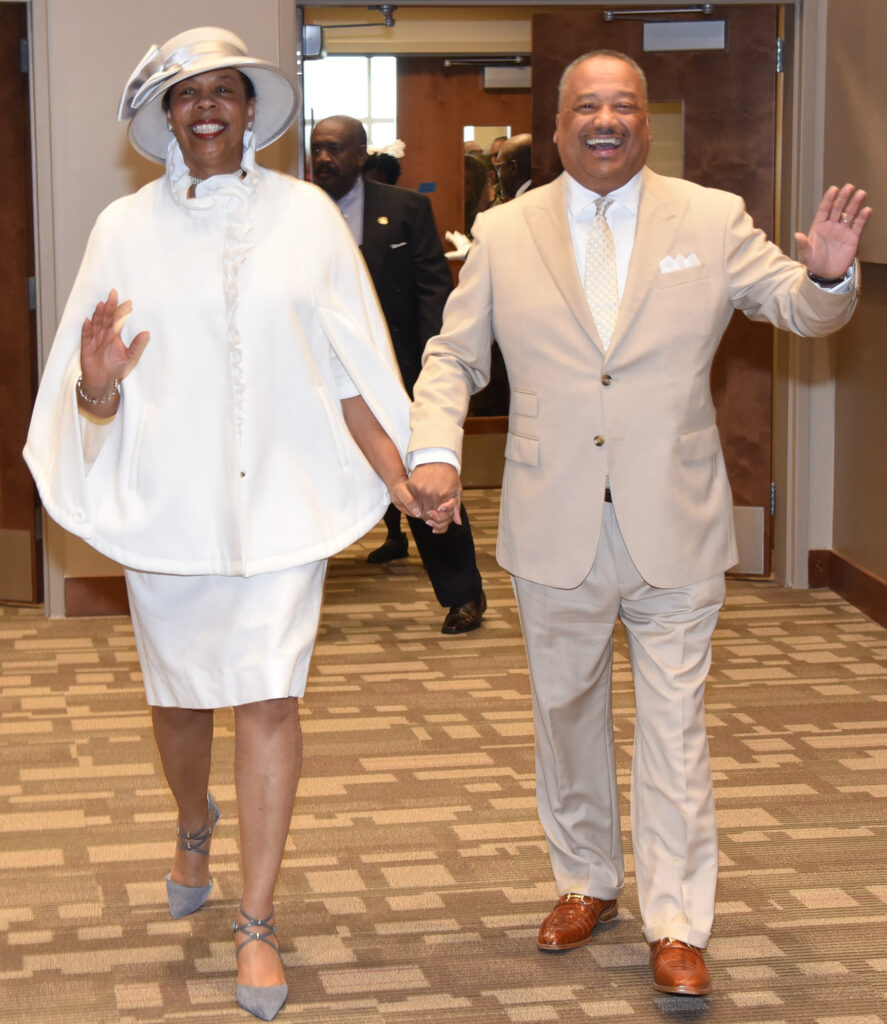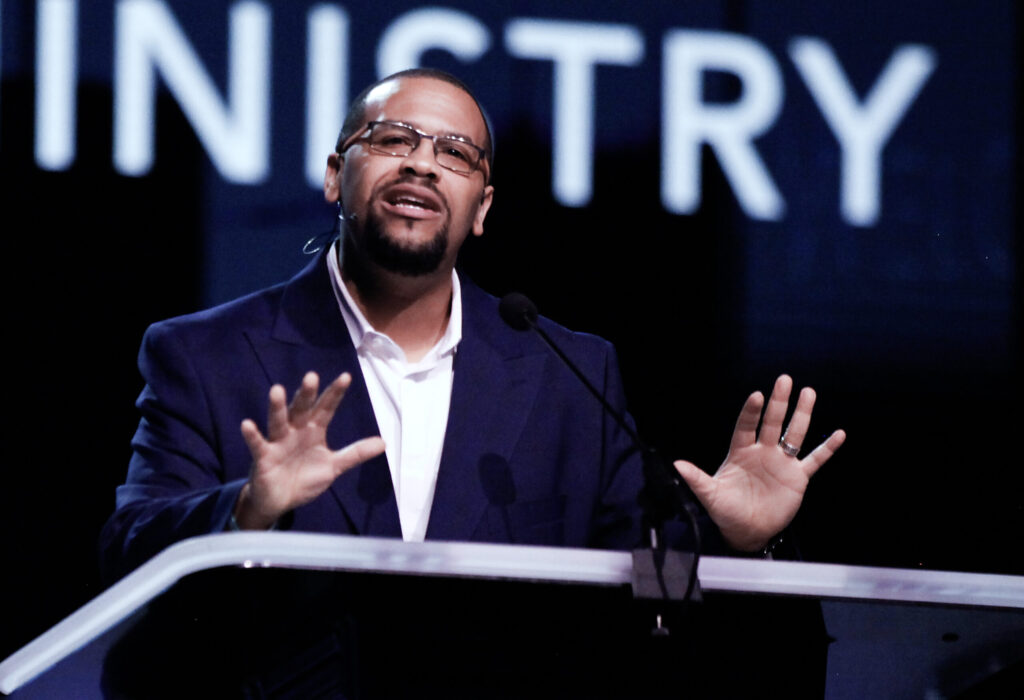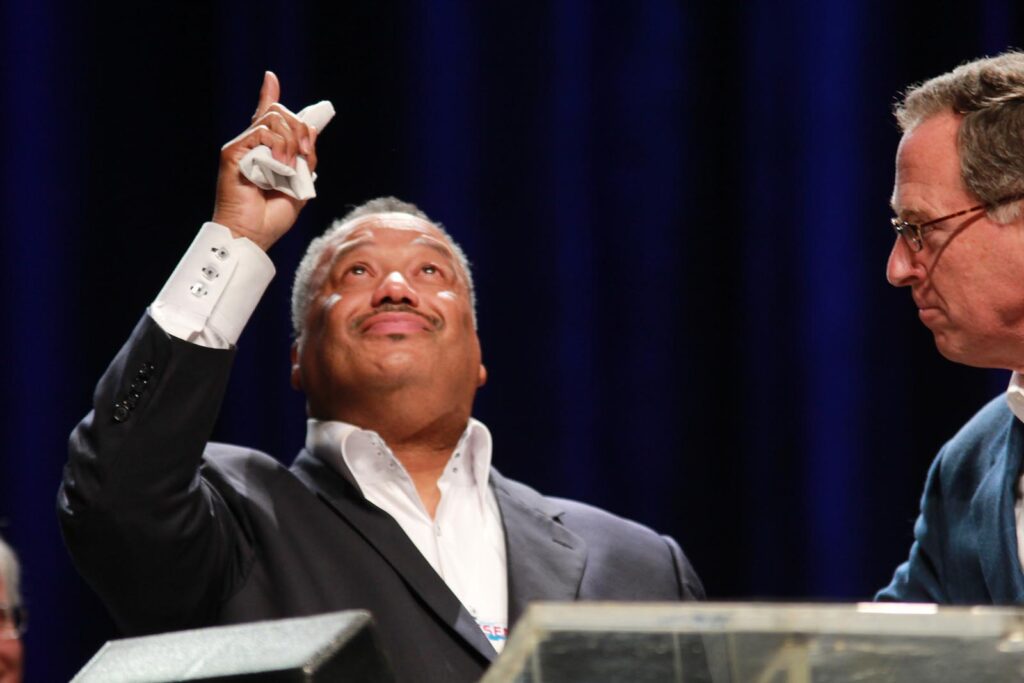Former SBC president Luter announces 2026 retirement; son voted to succeed him
NEW ORLEANS (BP) — Noah Lewis recalls a certain fire in the voice of Fred Luter Jr., the first time he heard him preach, perhaps a gift developed as Luter bellowed God’s Word on the streets of New Orleans in the mid-1980s.
Lewis and other members of the pulpit committee charged with finding a pastor for Franklin Avenue Baptist Church in 1986 heard Luter preach during a revival at Hill of Zion Baptist Church in Jefferson Parish.

“At that time Fred was just preaching on the street; didn’t have a church. He had never pastored before,” Lewis told Baptist Press 39 years later. “We felt he just had a kind of fire in his voice because being a street preacher, he was always preaching loud to catch the people on the street.”
The pulpit committee invited Luter to apply for the pastorate at FABC, at that time a struggling 54-year-old congregation of 60 or fewer members.
“He came by under the Southern Baptist auspices and said, ‘Well let’s see what you got.’ He was a high school graduate and he was licensed to preach. He wasn’t even ordained,” Lewis said. “And so we were taking what we thought was a great risk because he was going to take this church and see if he could make it go.
“And that’s exactly what happened.”
Luter was baptizing hundreds a year by the early-to-mid 1990s, and welcoming hundreds more. Membership surpassed 2,000 by 1993, according to the SBC Annual Church Profile, although Sunday morning worship attendance was not recorded until 1997, then averaging 3,650 from a membership of 4,394.
The 75-year-old Lewis was the lone remaining member of the 1986 pulpit committee at FABC when Luter announced his retirement from the pastorate Oct. 19, effective October 2026.
Lewis was also among the 95 percent of voters who elected Luter’s son, Fred “Chip” Luter III, FABC’s senior associate pastor, to succeed Luter as senior pastor of the church that is now home to 6,000 members.

“I announced the retirement. Of course, it was a shock to the church and I cried through it. They cried through it. But it’s just time,” Luter told Baptist Press. “Next year, I’ll be 70 years old, and I’ll be 40 years at the church. And so I said, those are two good round numbers. It’s just time.”
Luter’s leadership has been trailblazing. He served two terms as SBC president after his historic election in June 2012 as the first African American to lead the convention that formally repudiated slavery and racism, and apologized for its pro-slavery roots in 1995.
Luter became the first African American to have a building named for him at one of the six Southern Baptist seminaries when New Orleans Baptist Theological Seminary dedicated the Fred Luter Jr. Student Center in 2023.
To date, he remains the lone African American to have led the SBC, and the lone African American building namesake at an SBC seminary. But Luter gives credit to African Americans who paved the way for him to serve.
“I understood that it didn’t happen just because of me. I understood that I was standing on the shoulders of a lot of African American pastors who served in the SBC long before I became pastor,” Luter said of his presidential election. He named such pioneers as Sid Smith, E.W. McCall and George McCalep, all now deceased. He mentioned Elgia “Jay” Wells of Mt. Juliet, Tenn., who retired in 2012 as Lifeway Christian Resources’ director of Black church relations, and others.

“I was standing on the shoulders of giants who had paved the way for me,” Luter said of his election. “And it was just an unbelievable moment.”
Days after his election, ABC News named him person of the week. Former U.S. President Barack Obama, who was in his historic first term as the first African American elected to lead the nation, called to congratulate Luter. His cell phone rang, indicating a “private caller.”
“Normally I don’t answer those, but it was the day after I was elected, and I didn’t know if it was somebody in the convention trying to get in touch with me. And when I answered it, the person said, ‘Pastor Luter, can you hold for the president of the United States?’”
Perhaps it was a friend playing a joke, Luter surmised, but held the line.
“And about 10, 15 seconds later, here comes that music, ‘Hail to the Chief.’ It was him,” Luter remembered. “He said he had heard about what happened there in New Orleans and just wanted to call and congratulate. I thought that was incredible.”
Luter’s wife Elizabeth, whom he often refers to as his “prime rib,” his “good thing,” and the apple of his eye, told Baptist Press upon Luter’s retirement that she is “still in that dream” of Luter’s election.
“I am waiting for someone to wake me up. It is the most unbelievable happening in my life,” she said. “Nothing about it adds up. Literally, all my greatest spiritual highs, occurred during that timeframe.”
And the Fred Luter Jr. Student Center?

“I continue to seek the Lord for the ‘how’ and ‘why’ of that incredible honor. I have not received an answer,” she said. “It is so humbling. The dedication day was extreme. It is beyond all comprehension. Who can receive such a heavenly honor, and still live to talk about it?”
Lewis told Baptist Press that despite the committee having felt it was taking a chance on a young 30-year-old Luter in 1986, he is not surprised by Luter’s tremendous success in the pastorate nor among Southern Baptists.
Luter was impressed by Lewis’ career as an engineer, said Lewis, now retired. But Lewis told Luter in the first year of his pastorate that he knew he would excel in the pastorate.
“And I said, what’s going to happen. All this stuff you see on my little resume, you’re going to far exceed that. I said you’re special,” Lewis recalled. “He was 31 years old. I told him, I know that you’re going to make a change in more than just the way the church does business with its members. And he stuck to that.
“And to my knowledge, he hasn’t made any decision that was detrimental to him in any way,” Lewis said. “I’ve been in churches long enough, I’ve known about churches long enough, but this is the only church I’ve ever attended and never left.”
Luter shepherded the church through the construction of a new campus in the New Orleans Ninth Ward to accommodate the growing membership that exceeded 8,300 in 2005. When Katrina destroyed the campus in August of that year, he led the congregation in rebuilding in place, and ultimately building a completely new campus in New Orleans East where the congregation now worships.
In addition to the Luters, FABC has a pastoral team of six, a senior staff of five, and a support staff of 12. Among its numerous ministries are those focused on children, evangelism, men, women, addiction recovery, divorce care, holistic health, entrepreneurship, young adults and other concerns.
Luter expressed love and appreciation for the congregation and the SBC.
“I’ve always loved this congregation because, one, I’d never pastored before. And at the time, Chip was 2 years old, Kimberly was 4,” he said of his two children. “And the reason why this meant so much to me because, again, these people didn’t know me from Adam. I didn’t come from another church. I was not recommended by another pastor or association. They just gave me a chance based on my interview with them, based on my preaching opportunity that I shared with them.”
He especially appreciates that the church accepted him as its pastor.
“I will never forget that they trusted me to be their pastor, not knowing that one day I’d be president of Southern Baptist Convention, and we’d be one of the largest churches in New Orleans, the state of Louisiana,” he said. “But it all started from an opportunity that they gave me.
“That’s why I tell our young preachers all over, across America that I talk to, ‘Men, God rewards faithfulness. If you’re faithful to God, God will be faithful to you.’”
Elizabeth expressed thankfulness that God has carried FABC through three pivotal challenges, including changing locations, recovering from Hurricane Katrina and surviving the COVID-19 pandemic.
She expressed awe in seeing her husband lead the church to reach the men of the community and draw them into leadership at church, within their families and in the community.
“If I was not a witness from the start, I would not believe it,” she said. “To hear my husband voice his desire from the very beginning (to reach the men of the community), and watch the Lord answer accordingly, is priceless. Just to watch as faith turned to sight, is astonishing.”
Luter also expressed appreciation for the SBC, its work in racial reconciliation and its embrace of leaders of various ethnicities to serve in numerous roles.
“It’s been a great joy being Southern Baptist,” he said. “I tell people all the time, there’s no organization in America that can outdo Southern Baptists when it comes to mission and when it comes to disaster relief.”
He also expressed appreciation for having served as SBC president.
“When I was elected as president, it sent the message that maybe this convention is open to people of color, not only African American, but Asians and Hispanics. And then when I was elected, my platform was racial reconciliation,” he said. “And I saw a lot of African Americans across the country rise to different levels in their state conventions, executive directors, even there at the SBC, where Ken Weathersby became vice president.”
Weathersby retired in 2019 as vice president for convention advancement with the SBC Executive Committee.
Luter is looking forward to accepting preaching engagements that his fulltime pastorate and commitment to FABC have precluded.
“I’m not retiring from preaching,” he said. “I’m just retiring from pastoring.”